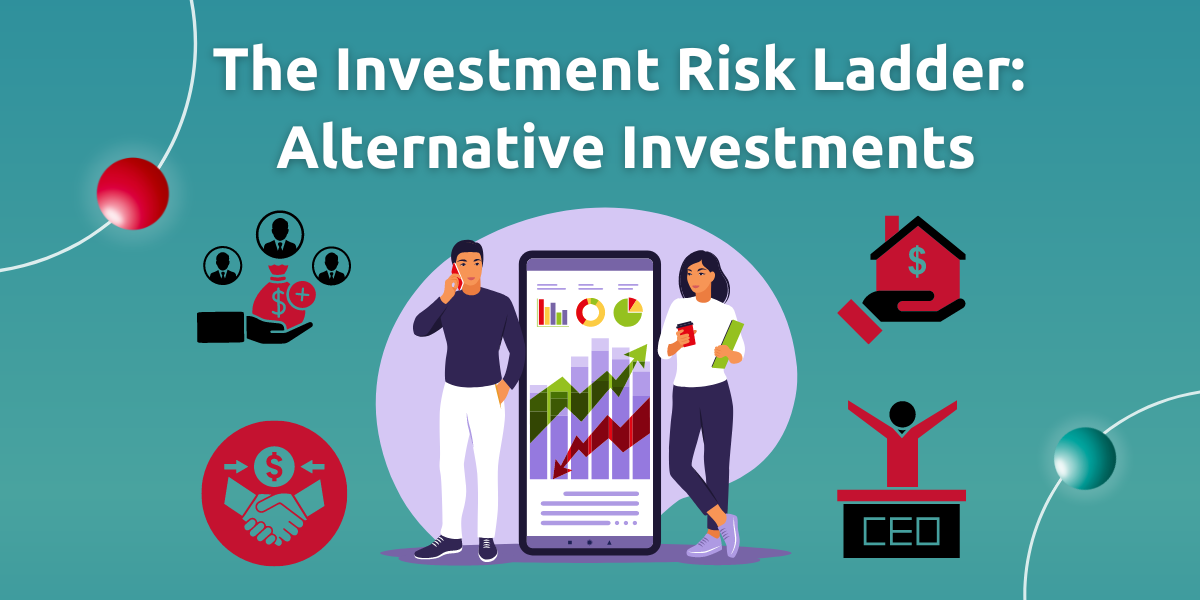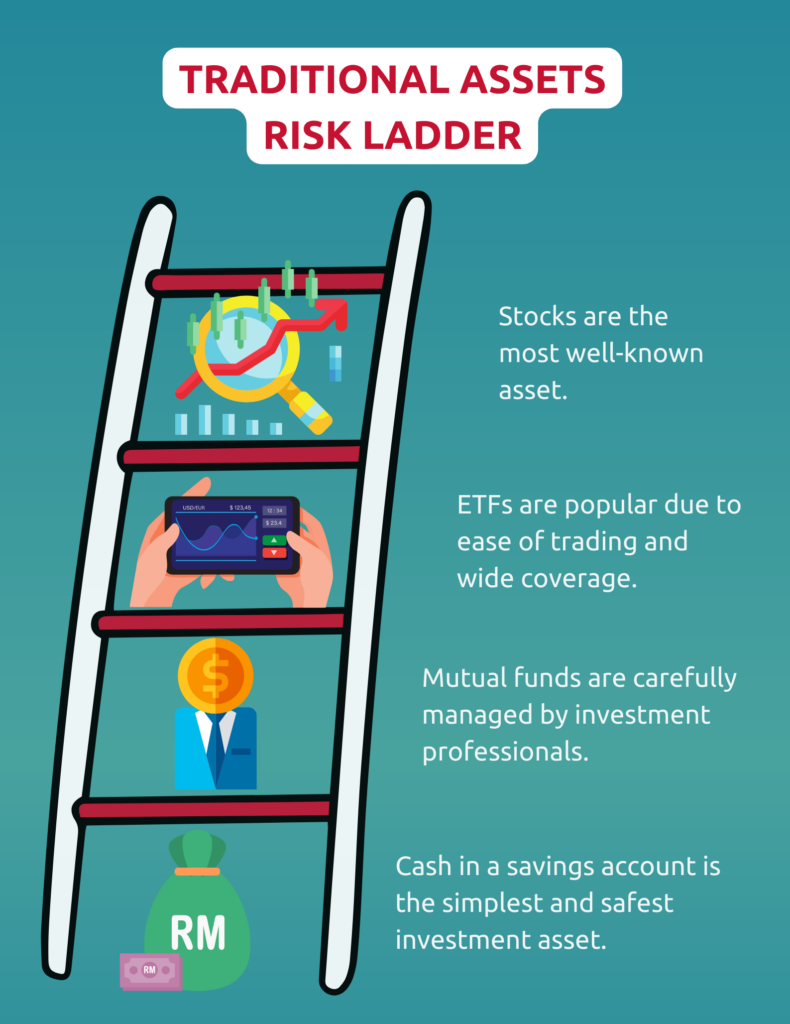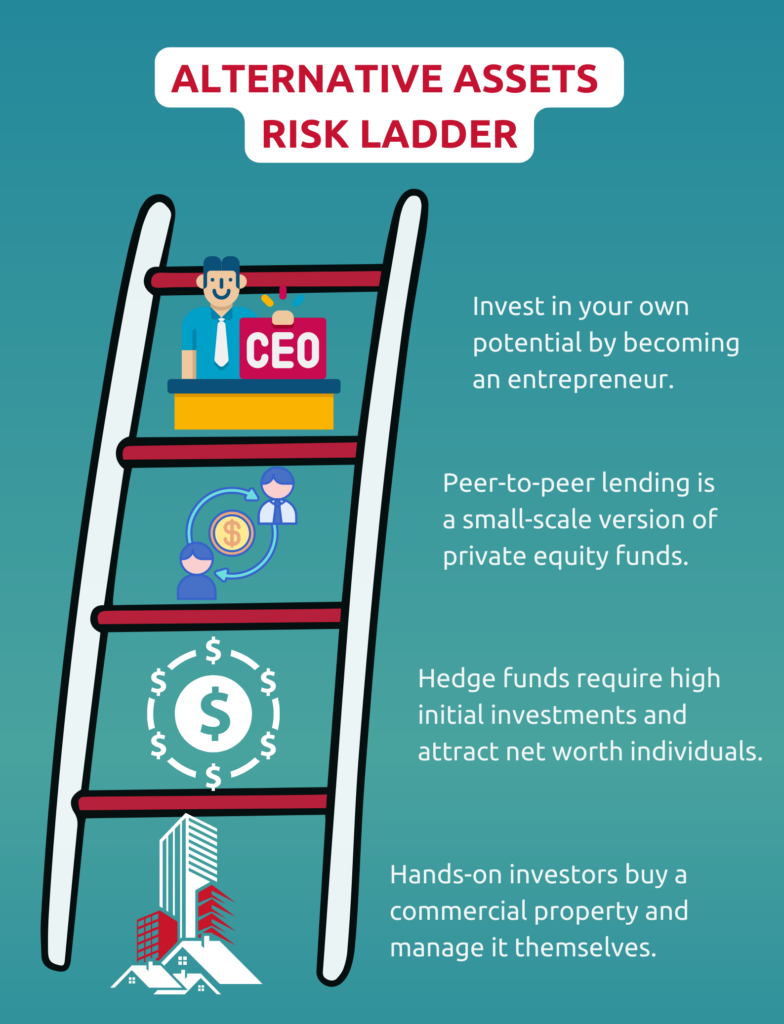The Investment Risk Ladder: Alternative Investments

Different types of investments have different risks associated with them. Taking the time to identify and understand the different types of assets, investment tools, and to distinguish the level of risk they offer – whether separately or in combination – can improve your portfolio and your future wealth prospects.
The investment risk ladder is a tool for identifying different asset classes based on their likelihood of providing returns over losses. In a traditional investment risk ladder, cash would be the most stable asset class, while alternative investments would be the least stable.

If you are new to investing or have only been doing it passively for a few years, exploring alternative investments can be risky for the health of your portfolio. Newer investors should focus more on building their portfolio up with traditional investment products including stocks, bonds, index funds, or exchange-traded funds (ETFs).
Before you begin exploring riskier asset classes, it is better to gain the skills and ability to recognise when such forays will be worth getting into, whilst simultaneously making sure you do not hurt your present and future financial ability.
Although diversifying your portfolio is a highly-recommended strategy, the ideal portfolio is a balanced one. With the right portfolio, you’ll be more able to explore alternate investment tools in the future. By then, you will have a clearer vision of your financial goals as well as the stability and knowledge to properly assess risks.

Banking On Land Banks: The Real Estate Strategy
If you grew up being told that you must buy a house one day, then you may wonder if real estate is an alternative investment asset – but buying a family home is a very different kind of investment from going into commercial property investment.
Investing in real estate means buying commercial or residential properties for leasing, renting, or to renovate for immediate sale (also known as house flipping).
If you do not want to deal with the day-to-day tasks of being a landlord or if house flipping sounds like way too much work, there are other ways you can earn from investing in property. You could invest in a real estate investment trust (REIT), which is similar to mutual funds in terms of set-up and management.
All-For-One And One-For-All: PE Funds
Private equity (PE) funds are when multiple investors pool their money together and trust an advisor to make investments on their behalf using the pool. Traditionally, these pools used to take controlling interest in a company, such as a reliable small business or a popular startup.
They sound like a great way to make money in a way that allows you to take as active or passive a role as you want – but they can be very risky to your portfolio if you are not fairly sound financially.
PE is the province of high-net worth or ultra high-net worth individuals with millions to spare on investments that will take years to see returns or may not even pan out.
The draw is that you are speculating with many other investors and relying on an experienced advisor to invest your pooled financial resources. Joining a pool of investors who are all equally excited about an inspiring new startup can have emotional appeal – but excitement can also lead to euphoric bad decisions.
The drawback is the fact that not every startup is Facebook. The startup your PE fund manager chooses might not have the ability to last 10 years, much less guarantee that you see substantial returns within that time. Also remember, your advisor may be an experienced old hand – but even they can be subject to bias.
A Direct Helping Hand: P2P Lending
Peer-to-peer (P2P) lending is like a smaller-scale version of a PE fund: you and other investors pool your money together, and then loan it directly to an individual or business that is asking for funds via P2P websites or apps. After a pre-agreed upon period, you will receive a fixed repayment amount each month (with interest).
The risk remains the same in many ways, as the individual or business tapping P2P lending may fail at their venture or the business may fold or run into unexpected troubles (such as when the COVID-19 pandemic hit, or the Ukraine-Russian war forced changes to economic regulatory practices). The returns can be high – but the risks are equally as high.
Going Solo: Starting a Business
If you have enough financial capability that you are looking at alternatives and you don’t mind a bit of risk, then why not invest in yourself? In an expanding digital marketplace, there are many niches you could fill. Customers are looking for more boutique, hands-on experiences as they no longer want to simply hand over their hard-earned cash to a faceless corporation.
When considering all the potential risky ventures out there that you can go for, this strategy has the same probabilities for success or failure; however, you will have added incentive to make it succeed – because the potential returns that you could gain if your business takes off will be the highest among the alternatives (not to mention the most satisfactory).
Explore alternatives safely with KDI
There are many alternative investments in the markets, and it will take time to select, filter, assess the risks, and monitor their performance. Some alternative products also require a minimum investment amount to start with – and these can be fairly high. As such, allow KDI to help you explore the alternatives in a careful and planned manner.
With an effective annual rate of 3.5%* as of October 2022, KDI Save is a great short-term cash management product that cashes in interest into your account daily, while you wait for the right opportunity to crop up.
Meanwhile, for worry-free diversification, KDI Invest is a robo-advisor that chooses ETFs with reliable market behaviour and without the risk of human emotion clouding judgement. These ETFs can represent a myriad of investment asset classes, from REITs to stocks. KDI Invest allocates your funds into ETFs based on your personalised risk profile.
All it takes is RM100 with KDI Save or RM250 for KDI Invest for you to start reaping the benefits of investing – with far greater safety and certainty.
* Terms and conditions apply
